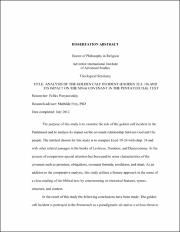| dc.description.abstract | The purpose of this study is to examine the role of the golden calf incident in the
Pentateuch and to analyze its impact on the covenant relationship between God and His
people. The method chosen for this study is to compare Exod 19-24 with chap. 34 and
with other related passages in the books of Leviticus, Numbers, and Deuteronomy. In the
process of comparison special attention has been paid to some characteristics of the
covenant such as promises, obligations, covenant formula, revelation, and ritual. As an
addition to the comparative analysis, this study utilizes a literary approach in the sense of
a close reading of the biblical text by concentrating on rhetorical features, syntax,
structure, and context.
In the result of this study the following conclusions have been made: The golden
calf incident is portrayed in the Pentateuch as a paradigmatic sin and as a serious threat to
the covenant. By making the molten image and worshiping it, the Israelites failed to
withstand in their relationship with God; thus, the covenant was completely broken from
their side.
This study shows that the covenant was not completely restored during the events
described in Exod 34, as most scholars assert. God’s promise given in Exod 34:10
marked only the beginning of the restoration process which ended when the rituals of Lev
8-9 were performed.
This study also demonstrates that the golden calf incident greatly affected the
relationship between God and His people. Before this incident the Israelite society was
described as a community of holy people where every member was promised a priestly
status. However, after the incident Israel is presented as a stratified society where priestly
functions are restricted to a small group of people and people’s holiness depends upon
their status. Nevertheless, through the keeping of the oath of Nazirite everybody in Israel
society could for a short time enjoy the style of living which in many aspects resembles
that of the High Priest. For this reason, the promise of becoming a kingdom of priests and
holy nation can be fulfilled for everybody in Israel.
Another aspect of the Divine-human relationship that was changed is the model of
revelation. The book of Deuteronomy introduces a new form of communication between
God and the people—through the ministry of prophets which should substitute the direct
public manifestation of God’s glory. | en_US |

